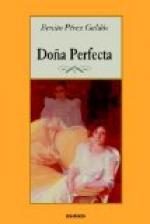=121= 6 =Volvio a sentarse=: R. 1187; K. 725,_a_; C. 107, 5.
=121= 19 =Recobrado el sentido=: R. 1228, 2; K. 741; C. 276, 5.
=122= 14 =_alla voy_=: ‘here I come.’ The verb =ir=, not =venir=, is used in answering a call (Eng. I’m coming = =voy=). =Alla= is not ‘here,’ but ‘here I come’ is the idiomatic equivalent of the phrase as a whole; besides, somewhat of the beat of the accents must here be kept in translation.
=123= 16 =Anticipo forzoso tenemos=: ‘they are forcing our hand.’
=123= 20 =Si=: the conclusion from this ‘if’ is concealed in the suspensive points at the end of the sentence.
=124= 6 =o sea=: ‘that is to say’ (lit. ‘or let it be,’ ’put it so’).
=124= 20 =por cuya razon=: cf. n. on p. 24, l. 7.
=125= 1 =behetria=: in the Middle Ages a =behetria= was a community (urban or rural) which had the right of choosing its own lord and of making a new choice from time to time. With the disappearance of the institution from actual life its reputation as a hotbed of uncertainty and contention grew all the stronger, and the word is used to-day to mean ‘anarchy’ (in a loose sense) or ‘turmoil.’
=125= 12 =_Gestas_=: italic because the word, like English ‘gest,’ is obsolete.
=125= 19 =cuando los Apostolicos=: ‘at the time of the Apostolics,’ a reactionary faction that undertook to get possession of the state in the last years of the reign of Ferdinand VII (1814-1833). Galdos has devoted to them one of his series of Episodios Nacionales.—=la guerra de los siete anos=: the Carlist uprising in 1833 and the following years.
=125= 20 =1848=: a revolutionary year in all Europe; not so conspicuously so in Spain, yet cf. p. 129, l. 25.
=125= 23 =la guerra de la Independencia=: i.e. against Napoleon; generally known in English as the Peninsular War (1808-1814).
=125= 27 =con visos de=, etc.: ’looking like a representative or instrument of the central power.’
=126= 13 =por do quiera que=: ‘wheresoever.’ The antiquated form =do=, doublet of =donde=, is now preserved only in phrases in which it is followed by =quiera=, and in a few locutions like =a do=, ‘whither.’
=126= 15 =municipio=: ‘city authorities.’
=126= 33 =caben=: R. 1155; K. 529, a; C. 284.
=127= 18 =entre tu y yo=: cf. n. on p. 46, l. 19.
=128= 11 =dar la direccion a los globos=: before the development of aviation, to give steering power to balloons was one of the perennial enterprises of the most wildly ambitious type of inventors.
=128= 23 =me pican=: ‘bite’ (of mustard, garlic, etc.).
=129= 5 =periodico suelto=: ‘irregular periodical’ (hence appearing when and where least expected). The most familiar type of irregular periodical in the Spanish-speaking world is the revolutionary sheet (to-day usually anarchistic) which is driven to the announcement “Aparece cuando puede” by the double pressure of poverty and governmental hostility.




